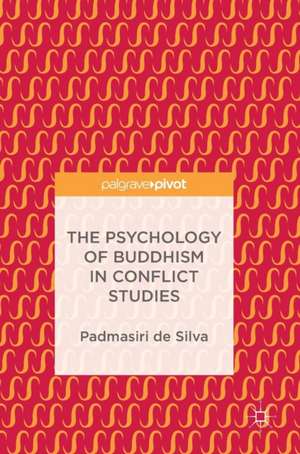The Psychology of Buddhism in Conflict Studies
Autor Padmasiri de Silvaen Limba Engleză Hardback – 20 noi 2017
| Toate formatele și edițiile | Preț | Express |
|---|---|---|
| Paperback (1) | 409.63 lei 6-8 săpt. | |
| Springer International Publishing – 23 mai 2018 | 409.63 lei 6-8 săpt. | |
| Hardback (1) | 415.77 lei 6-8 săpt. | |
| Springer International Publishing – 20 noi 2017 | 415.77 lei 6-8 săpt. |
Preț: 415.77 lei
Nou
Puncte Express: 624
Preț estimativ în valută:
79.56€ • 82.08$ • 66.39£
79.56€ • 82.08$ • 66.39£
Carte tipărită la comandă
Livrare economică 26 martie-09 aprilie
Preluare comenzi: 021 569.72.76
Specificații
ISBN-13: 9783319690285
ISBN-10: 3319690280
Pagini: 90
Ilustrații: XIX, 90 p.
Dimensiuni: 148 x 210 mm
Greutate: 0.29 kg
Ediția:1st ed. 2017
Editura: Springer International Publishing
Colecția Palgrave Macmillan
Locul publicării:Cham, Switzerland
ISBN-10: 3319690280
Pagini: 90
Ilustrații: XIX, 90 p.
Dimensiuni: 148 x 210 mm
Greutate: 0.29 kg
Ediția:1st ed. 2017
Editura: Springer International Publishing
Colecția Palgrave Macmillan
Locul publicării:Cham, Switzerland
Cuprins
Preface.- Chapter 1 Introduction.- Chapter 2 The Buddhist Critique of Metaphysical Entanglements.- Chapter 3 The Many Faceted Nature of a Crisis.- Chapter 4 The Psychological Dimensions of Conflict and Harmony.- Chapter 5 Criminal Justice through a Buddhist Contemplative Path.- Chapter 6 Exploring Multiculturalism.- Chapter 7 Dilemmas, Conflicts and Paradoxes in Management Studies.- Chapter 8 Erosion of Moral Values in an Era of Market Triumphalism.- Chapter 9 Conflict and Peace Studies.- Chapter 10 Idea of the Self: the Narrow Ridge between the paths of chaos and nihilism and the Traps of Identity Illusions.- Chapter 11 Dialectical Behaviour Therapy.- Chapter 12 Resolving Paradoxes in Tibetan Buddhism and Zen Buddhism.- Chapter 13 Emotions, Logic and Rationality.
Notă biografică
Padmasiri de Silva is Adjunct Research Associate at Monash University, Australia. He has a PhD in East-West Comparative Philosophy and an advanced diploma in Counselling. He is the author of a number of books, including An Introduction to Buddhist Psychology and Counselling; Emotions and the Body in Buddhist Contemplative practice and mindfulness-Based Therapy (Palgrave Macmillan 2017).
Textul de pe ultima copertă
This book provides an interdisciplinary discussion of conflict studies, drawing on perspectives from psychology and Buddhist studies. The author combines current research in psychology, conflict and management studies, as well as moral narratives drawn from religious and cultural contexts, to offer useful guidance on dealing with conflict and dichotomies. Drawing on a vast corpus of Buddhist literature, this book examines complex teachings, ideas and doctrines to bring insight to how individuals and societies might lead peaceful and balanced lifestyles. In this ground-breaking study Padmasiri De Silva insists that the social studies need to develop dialectical methods and understanding in addition to the objective and analytical collection of facts. Chapters cover an array of subjects including economics, ecology, human wellbeing, prison reform, dialectical behaviour therapy, multiculturalism, and peace studies.
Caracteristici
Offers perspectives from psychology, philosophy, therapy, management studies, education and social studies Provides Buddhism inspired insight to enhance current debates Discusses how integration and balance can be used to develop a methodology for unravelling dialectical oppositions
